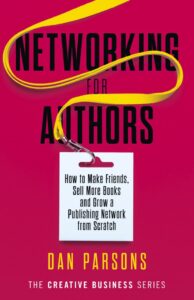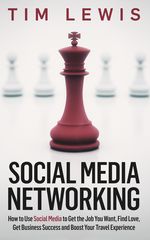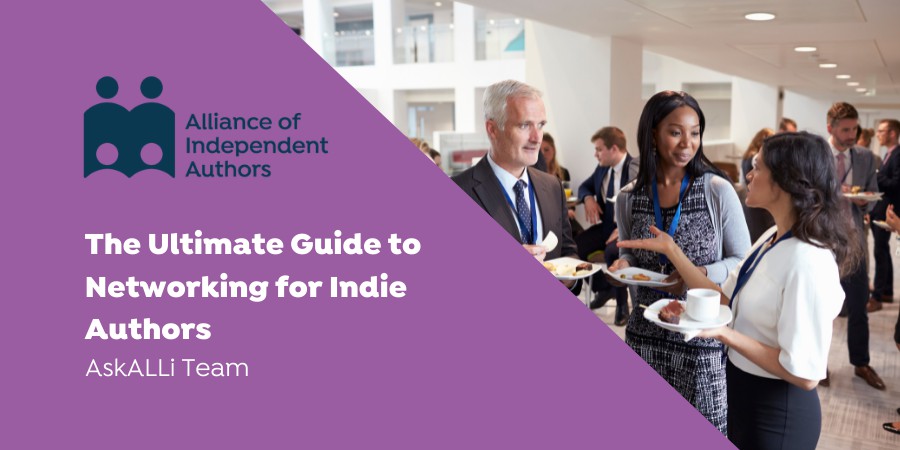Networking for Indie Authors: In Person Events

Daniel Parsons, Author
Dan Parsons writes bestselling guides for authors, as well as teen fantasy and horror (under Daniel Parsons) and a weekly blog for The Self-Publishing Formula. In the past, he has worked for three publishers, managed two bookstores and listened to an unhealthy amount of podcasts. find out more about him on his website and Twitter or purchase a copy of his book Networking for Authors.
Mental preparation is important for networking success. However, you need to combine it with practical preparation to get the best results. In this adapted excerpt from my book Networking for Authors, we will explore what actionable steps you can take before an event to help you succeed. Some advice comes from personal experience, whereas other tips have come as recommendations from trusted, successful sources.
Book a Hotel
If the event is far away and spread over more than one day, I can’t stress this enough: book a hotel. Even if you could commute and attend without booking one, the advantages of having a room are too plentiful to ignore, if you can afford it.
The first time I visited The London Book Fair, I didn’t follow this advice. To save money, I underwent an extremely early commute and spend the day struggling against an uncomfortable brain fog. Plus, I missed an author afterparty – a side-event where authors gather in a bar after the main conference closes for the day – because I had nowhere to stay the following night and had to return home for my day job.
Due to these mistakes, I only got a fraction of the worth out of my first big networking experience. In return for saving cash, I forfeited focus for the day, comfort, and the ability to attend an additional networking opportunity. Don’t be like Young Dan. Companies book business class plane seats and comfortable hotel rooms for employees for a reason: employees who arrive at meetings well-rested perform better. You don’t need to travel like a royal but there is definitely merit to be found in booking accommodation.
As a minimum requirement, for a multi-day networking event, you should book a hotel room for the night before the event so you can arrive well-rested. If possible, you should also add an additional night to take advantage of any extra invitations you receive during the day.
 Visitors who live nearby are often eager to do extra networking after the official itinerary has ended as they don’t have to worry about getting home. And those who are staying in a hotel have little else to do so will be keen to make the most of their short stay. That means people go out for drinks, meals, or see the sights together.
Visitors who live nearby are often eager to do extra networking after the official itinerary has ended as they don’t have to worry about getting home. And those who are staying in a hotel have little else to do so will be keen to make the most of their short stay. That means people go out for drinks, meals, or see the sights together.
Join a Professional Organization
Signing up to organizations like the Alliance of Independent Authors among others can provide worthwhile benefits.
The main benefits of membership are usually on their website – like having access to experts who can talk you through publishing contracts to ensure you get a fair deal. One of the best perks is getting access to networking events for members. Sometimes you can tag along if you’re not a member but you’re unlikely to know when and where they are unless you call them or keep tabs on their website. Even then, they won’t necessarily advertise every meeting because some will be invite-only.
Once you arrive, hosts are usually extremely busy, torn between entertaining existing members and shepherding potential new recruits. But this gives you an opportunity to show your worth and become a valued member. Being valued isn’t something you can pay extra for; it’s earned. I’ve seen several authors enter an organization’s trusted inner circle by helping in this way. It doesn’t take a lot of effort. All you usually have to do is chat to interested newbies about the community and its benefits while the organizer is busy.
Authors I know who started this way have since gone on to be central figures in the community, invited to host podcasts and speak onstage for the organisation. The community’s clout gave them social kudos, opportunities and confidence they would have struggled to achieve on their own.
Follow Group Activities and Trending Hashtags
Advertising an event doesn’t stop the moment the event starts as it once would have, and it doesn’t always look like advertising. There’s still a place for billboards and ads printed in magazines for the bigger trade shows but many events aren’t promoted with traditional adverts anymore.
Do you know how lots of conferences are now promoted? Influencers. People of influence with huge social media followings. They either create events of their own or they are asked to broadcast the news of events run by someone else.
Alongside influencers spreading the word, organizers also create Facebook groups and hashtags for Twitter and Instagram. That way, ticket holders can talk to each other and share their experiences so people who aren’t attending can follow the action.
Marketing continues throughout the event and beyond. Attendees talk about how they got to the event, where they’re staying, who they’ve met, the lessons they’ve learned, what they plan to do differently next year.
Much of this activity resembles native social media activity and blogging more than marketing carried out by the organisers. It’s an example of what I refer to as complicit marketing – word of mouth, broadcast in the form of tweets, videos, images and soundbites. And it’s all disguised as social commentary because those helping are customers who have become invested in the event and want it to succeed. They share selfies and write things like:
“En route to #20BooksVegas! It’s so good to have wi-fi again after such a long flight.”
Or:
“Met up with an old friend at The London Book Fair for pizza today. #LBF”
While organisers undoubtedly love free advertising, they aren’t the only ones who profit. There are lots of side benefits that extend to those who can’t go but still want to follow along, like live-streamed seminars and getting a sense of being there without having to travel. The biggest winners, though, are those attending the event.
One way they benefit is by scrolling through a group feed or a communal hashtag to identify their fellow attendees. In doing so, they can spot them anywhere and instantly fire up a conversation, providing they’ve done a little research. You can do this yourself to figure out who you want to meet, what interests them and where they are going to be.
I’ve personally used this tactic to pre-schedule meetings. It’s a great time-saver as it allows you to line up meetings rather than rely on serendipitous encounters.
The final benefit of an event having a social media presence is that new-found friends can connect more easily afterwards. You won’t always remember a person’s name after a chance encounter, but you’ll probably be able to pick them out and befriend them if they’re tagged in a photo that shows up in your feed.
Work Out Your Itinerary
If you visit a large trade fair, you’ll discover it comes with a boatload of seminar options. The London Book Fair is a three-day event, boasting talks on editing, translation, movie rights, audio production, digital streaming, printing methods, future tech and more. Each day, there are 20+ talks and panels, all with different speakers. You can learn a lot and meet extraordinary people. However, getting the best out of each event takes planning.
Events overlap and many are delivered from different stages spread across the site. That means you must plan your itinerary ahead of time.
A good way to get as much value as possible is to print out the entire multi-day itinerary – usually scores of potential talks – and whittle away the ones you don’t mind missing. That leaves you with a list of four to five a day, consisting of must-visits and sessions that sound interesting. It’s possible to fit in more but that would allow no wriggle-room to network in-between or navigate your way around the building.
Planning will allow you to feel calmer and more prepared in an otherwise chaotic few days. In turn, that will give you the mental bandwidth needed to make great decisions and jump on opportunities that come your way.
Have Business Cards
It’s important to get business cards printed before your first event. They don’t need to be fancy or expensive. Plain black text on a white background is fine as long as they contain the necessary information:
- Your Name
- Phone Number (Optional)
- Email Address
- Your Job (Author, Illustrator, etc.)
- Website URL
- Social Media Links or Handles
You can include other details if you have something special to share. For example, some people include their address. Others have double-sided cards if they have two jobs (e.g. author and editor).
Even if the card has a plain design, it reminds people that they met you and gives them the information they need to contact you again. Plus, it offers them your name which – take it from me – most people will have forgotten the moment you tell them, never mind days, weeks or months after the event.
Build Your Team
Billionaires often talk about diversification when they’re asked for investing advice. Once they make their fortune, they quickly learn that the way to ensure they don’t fall back to Earth is to diversify. That way, no matter what happens, they always have a portion of their cash invested somewhere that delivers returns.
In many ways, networking follows the same principle of diversification. The best way to network is to build a diverse, self-sufficient team of collaborators. They won’t necessarily work together, but they will all work with you. And while one connection might propel you into the cosmos, it’s important to maintain contact with alternatives. That way, if that stellar contact disappears, you still have the means to produce and market your own work.
It’s thrilling to be “picked up” by a decision maker or publisher, but a more stable plan is to become that decision maker. To pick yourself. Build a network of savvy professionals to handle everything from your cover design to accounting is a lot more work but it means never finding yourself in a weak position. Never begging for exposure or someone else’s business infrastructure to keep you growing.
Act Powerfully
According to an article published by Ivy Exec, a website that teaches elite professionals how to advance their careers:
“In business, knowing when to walk away is key – whether it means deciding against an acquisition that on paper would create significant synergies, saying no to a deal when the price is becoming unreasonable, leaving a toxic workplace, or simply leaving for a better atmosphere.”
This advice applies to networking authors. That’s because many self-identify as a “starving artist.” As such, they go into conversations looking for someone to save them because they don’t consider themselves to be business-minded. From their first word, they exude weakness that can almost always be overcome if they committed to understanding the business of publishing.
Some people experience genuine issues such as anxiety and dyslexia that limit their performance potential in business. However, the idea that starving writers are too “artsy” to learn basic business principles is often misinformed. Once you realise you can choose to save yourself, you can take on this well-informed Ivy Exec advice.
Negotiation success is dependent on power. If you go into every negotiation believing that you need a deal no matter the cost, your contact will sense that desperation and take advantage. That’s how you end up with the brunt of a collaboration workload, your name printed smaller than someone else’s on a book cover or a smaller cut of the profits.
By contrast, entering a conversation having decided that you don’t need a particular outcome means opening yourself up to:
- better terms because you’re less likely to cave
- contacts who respect you and your work
A powerful mindset can even mean getting a deal you once would have lost. The fact is, desperation isn’t attractive. It comes across as weak and/or salesy. Lacking desperation and being prepared to part ways without a deal on the other hand, can make you warmer and more relaxed. Many creatives would rather work with that person because they hate hyper-competitive corporate personalities.
Ultimately, feeling you can walk away means potentially giving up a toxic “opportunity” now for an exciting one later. It makes negotiating more enjoyable. To make this easier, think of the whole experience as if it were a job interview. Only, you’re not the interviewee, desperate for the job: you’re the employer, assessing whether this stranger is right for your business. Thinking this way will help you make better decisions and lead you to work with people on terms that are mutually beneficial.
Enjoy Yourself
As a final tactic for your first event, my best advice would be to enjoy yourself. Relax! I mean, you’re an author, hanging out with other people who love books. For some, that’s living the dream!

im Lewis, ALLi Author Member and Twitter chat host
Networking for Indie Authors: Social Media
Tim Lewis is a former IT manager who in his efforts to work out how to sell fantasy books online, became fascinated by using social media for business and networking. He has spoken at Cambridge Social Day, Sharing Social London and the What's Up Social event about networking and the future of social media and also runs the #indieAuthorChat Twitter chat for the Alliance of Independent Authors.
 The first thing to do is to get yourself established on the social media platforms. I always recommend people start with Twitter. This may seem odd as Facebook is the larger network, but there are a number of reasons for this: Twitter is really very open. You can find people, follow anyone, reply to anyone and see all of their conversations. It is easy to “fake” looking important on Twitter.
The first thing to do is to get yourself established on the social media platforms. I always recommend people start with Twitter. This may seem odd as Facebook is the larger network, but there are a number of reasons for this: Twitter is really very open. You can find people, follow anyone, reply to anyone and see all of their conversations. It is easy to “fake” looking important on Twitter.- For finding a job then you want to be looking to connect with people in the industry and relevant journalists.
- For looking for romance, find people interested in topics that you are passionate about and look to find communities where you can interact with other people interested in those topics, preferably containing a large proportion of the kind of people you are interested in.
- For making connections for arranging speaking gigs, you want to be looking for conference organisers, speakers at conferences and people related to the topics that you want to be talking about.
- For travel or location-related objectives you want to be looking to make connections and groups related to the area you are interested in going to.
Networking for Indie Authors: Member Experiences
“I have networked with numerous local businesses who not only allow me to do book signings but inviting me. This includes restaurants, coffee shops and banks. My local bank asked what I was doing that day and I responded, it's sunny so I will write in the garden. They invited me to do a book tour which then led to a book tour of the banks in the region. The key to successful networking is first relationship and then delivering value. It's also about being friendly and supporting others in the first instance. Another example was my visit to Glamis castle to see a temporary display of the Royal Robes. I got chatting to the guide and then asked who I would speak to in order to run a joint crime writing conference called Crime at the Castle. She said she was the events manager and we took it from there. So, being friendly, pleasant, and confident can take you a long way.”
“I attended the Festival of Writing (run by Jericho Writers) four years ago and was urged to join their online 6-week Self Editing course (which was fabulous), both of which led to me building friendships with other writers and getting to know their writing friends. At the Festival, I just got into conversation with people who were obviously on their own or who I was sitting next to, talking about some aspect of the talk we’d just been to, or another aspect of the weekend event. The alcohol fuelled dinner on Saturday night helps!
One of the friends of a writer I got to know in this way set up a Twitter group for mutual support which has helped me to get to know others. As members got publishing deals or self published, we all supported each other by sharing and promoting news about our books. That’s continued, and it’s led to me being invited to appear as a guest on other writers’ blogs which was a big help when I launched my first novel.
So I agree with others here who say that if you give lots of support to others, you’ll get it in return. It’s fantastic to know that there’s always someone there to give you encouragement when things are hard and to celebrate milestones with you.”
“I'm a member of the Romantic Novelists' Association. A few years ago, I asked if any northern members would be interested in meeting up in Hebden Bridge, on the border between Yorkshire and Lancashire. Our group grew bit by bit. I suggested putting an anthology together, using the town as the setting. We're about to release our third Miss Moonshine anthology. They've done really well in KDP and were stocked in the bookshop in Hebden Bridge. We now have an agent looking at foreign and film rights. This is a side project for us and hard to find time to devote to it, but we'll be going wide with the anthologies later in the year.” Find the first Miss Moonshine anthology and here.
“My book is about the anatomy and physiology of the human body and I’ve worked for many years as a complementary therapist (and also taught anatomy and physiology). I’ve done presentations from various chapters of my book for groups of therapists online (e.g. reflexology book club) and next week I’m doing a zoom session about the immune system (based on content from my book) for a group of student therapists. In most cases these opportunities came from sending copies of the book out.I included a postcard with a summary of the book on the back and a bookmark – both of which I had created and printed. I offered to do a presentation and said if they were interested they could contact me after they had read (and hopefully enjoyed!) the book.”
Heather networked with local attractions and shares a template letter that worked for her.
“I’m a children’s author and I have been networking with the corporate organisations with whom I have used as a setting in my books. For example, Tillie at Jamaica Inn in Cornwall, I stayed at the hotel and got to know the owners. Also the Newquay Activity Centre. For Tillie and the Amazing Ghost Dog, I have been in contact with the owners of Blackpool Pleasure Beach and gained their permission to use the rides in my book. These companies have been extremely interested in my books and offered to sell them in their tourist area.
In the first instance, I looked on their websites for the directors of the company or the main person to contact. I constructed a really nice email letter telling them all about my books and why I wanted to use their company/ setting in my next book. It’s mostly been received with enthusiasm and with much interest, even asking what or how they can contribute to help. Jamaica Inn took a photo of their pirate sign and gave me permission to use it. Blackpool Pleasure Beach have read an arc copy of my book to be published soon and approved everything but wanted a mention in the copyright page. The only negative response I had was from a knitting pattern company who would not give their permission to use one of their knitted characters in a picture book. That’s a long story!
ALLi’s legal team were really helpful with their advice on that when I contacted them.”
Dear Sir,I’m a children’s author writing under the pseudonym of Heather B. Moon. I am plotting my latest book and I wish to use Blackpool Pleasure Beach as a place for my character to visit. I would also like to mention the names of some rides.I am writing to ask for your permission for this use.If you need further further information about my published works please visit my website (link to website).I do hope I may use the true name of Blackpool Pleasure Beach in my book as it was a place that gave me and my family many happy hours of fun and pleasure in our formative years and I’m sure many children from all over the UK can relate to it.Yours sincerely,…
“For the past few years I have run two authors' groups, using Meetup dot com to manage them. Meetup is a great way to promote your authors' group to likeminded writers, in your geographical area if you are meeting physically (as we did prior to Covid restrictions) and in your area of interest if you are meeting online. (We now Zoom.) Due to huge demand, I have restricted membership to ALLi members only, which guarantees we are like-minded although writing in different genres. I've made lots of new writer friends this way, and it has been really exciting to watch authors progress, all sharing each others' success. We always learn from each other (as we do on the ALLi FB forum), as well as offering moral support.
I wrote a guest post for ALLi a few years ago about setting up a local lit fest in my village, the Hawkesbury Upton Lit Fest, which I did partly to give my local community a free literary event to enjoy, and partly to network and benefit other authors (not all indie, but mostly). Authors who take part really enjoy the opportunity to network with fellow authors on panels and between events in the programme, and many lasting friendships have been formed that continue between festivals. www.hulitfest.com




